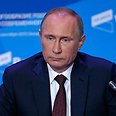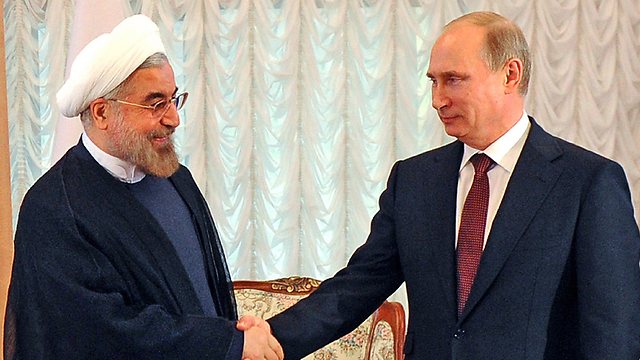
Putin may be last hope for Israel to prevent Iran agreement
Iranian, Russian leaders communicating by telephone, Kremlin says; in midst of American 'rush' to reach settlement with Iran, Israel carries eyes to Russia in final attempt to stop any agreement
Meanwhile, as Prime Minister Benjamin Netanyahu gears up for a visit with the Russian president on Wednesday, senior Israeli officials claim that with America deadset on reaching a deal with Iran, Russia is Israel's last hope.
Related stories:
- Op-ed: Putin controls Middle East
- Netanyahu: Kerry to arrive Friday, Iran under presure
- Iran unveils drone which can reach Israel
The Kremlin said Putin and Rohani had spoken by telephone at the Russian leader's request, two days before negotiators from Iran and six global powers hold their next talks.
"...In the context of the Iranian nuclear program, Putin underlined that at the moment a real chance has appeared to find a solution to this long-running problem," the statement said.
It did not say how Rohani had responded, other than quoting him as saying he approved of Russia's contribution to the talks on Iran's nuclear program. But the Kremlin added that Rohani gave a "high grade" to Russia's role at the so-called P5+1 negotiations that besides Iran include the five permanent UN Security Council members, and Germany.
"We know that the Iranians are only a few months away from giving up hope on their nuclear program, if the sanctions were to continue; but the Americans are keen on reaching an agreement," said a senior Israeli official close to the Iranian issue Monday.
Israel is frustrated by the Obama administration; even those in close contact with the White House find it hard to explain what Jerusalem calls "the (American) rush to reach an agreement."
But Jerusalem has turned its eyes to the Kremlin, and now hopes that Netanyahu's meeting with Russian President Vladimir Putin on Wednesday will yield success.
The hope among the Israeli administration is that Netanyahu will convince Putin to postpone any agreement with Iran.
"The Russians have already surprised us in the past, and they don't like the idea that America is the hero of this story. They also don't like the idea of a nuclear bomb in their own backyard."
Putin's upbeat comments followed remarks in which a senior US official said it was possible a deal could be reached when negotiators meet in Geneva from Nov. 20, and Russian Foreign Minister Sergei Lavrov also voiced optimism.
The last round of talks between Iran and world powers earlier this month came tantalizingly close to finding a framework agreement that would have suspended some elements of Tehran's disputed program in exchange for partial sanctions relief.
The terms of the potential deal have been vehemently opposed by Prime Minister Benjamin Netanyahu and some powerful members of the US Congress.
Netanyahu - who views a partial suspension of sanctions as detrimental to the negotiations - outlined his opposition to the agreement during talks with French President Francois Hollande on Sunday.
The Israeli head of state will continue his diplomatic offensive when he meets Putin in Moscow on Wednesday and receives US Secretary of State John Kerry on Friday.
Reuters and AFP contributed to this report
- Receive Ynetnews updates directly to your desktop











